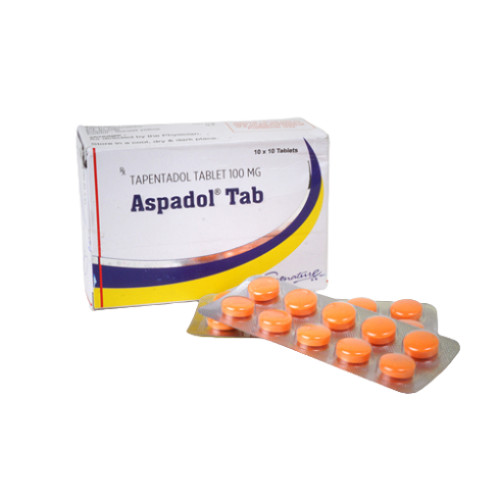views
Aspadol 100mg is a potent pain relief tablet containing Tapentadol, used to treat moderate to severe acute or chronic pain. With dual-action benefits, Aspadol 100 (also known as Aspadol 100 mg) effectively manages both nerve and musculoskeletal pain, offering fast and lasting relief under strict medical supervision.
Managing pain—whether acute or chronic—can be challenging and overwhelming. For those suffering from severe pain due to surgery, injury, or chronic conditions like arthritis or neuropathy, Aspadol Tablets provide a highly effective solution. This article offers a detailed overview of Aspadol, particularly Aspadol 100, including its uses, dosage, mechanism of action, and safety precautions.
What Is Aspadol?
Aspadol is a prescription painkiller that contains Tapentadol, a centrally acting opioid analgesic. It is designed to manage moderate to severe pain and is particularly helpful for individuals who do not find relief from traditional pain relievers like NSAIDs (e.g., ibuprofen) or weak opioids.
One of the most commonly prescribed dosages is Aspadol 100mg, also referred to as Aspadol 100 or Aspadol 100 mg. This strength is typically reserved for patients with persistent or long-term pain who require more potent relief.
How Does Aspadol Work?
Aspadol works through a dual mechanism of action:
1. Mu-Opioid Receptor Agonism: Tapentadol binds to the opioid receptors in the brain, altering the body’s perception of pain.
2. Norepinephrine Reuptake Inhibition: It also increases norepinephrine levels by preventing its reuptake, which enhances pain control, especially in nerve-related conditions.
This dual-action mechanism sets Aspadol 100mg apart from traditional opioids, providing better coverage for both nociceptive (physical injury) and neuropathic (nerve-related) pain.
Common Uses of Aspadol Tablets
Aspadol is typically prescribed for:
· Chronic Musculoskeletal Pain (e.g., osteoarthritis, back pain)
· Neuropathic Pain (e.g., diabetic neuropathy, sciatica)
· Postoperative Pain after major surgeries
· Severe Injury-Related Pain
Doctors often recommend Aspadol 100 mg for patients who have not responded well to other pain medications and require strong, round-the-clock pain management.
Dosage and Administration
Aspadol 100mg is generally taken twice daily, or every 12 hours, as prescribed by a physician. It is essential to:
· Swallow tablets whole—do not crush or chew them.
· Follow medical advice strictly to avoid overdose or dependence.
· Avoid alcohol while on Aspadol, as it increases sedation and the risk of serious side effects.
Dosage may vary based on age, medical condition, and the severity of the pain. Your doctor will determine whether Aspadol 100 is the right strength or if a different dose is more appropriate.
Potential Side Effects
As with any opioid-based medication, Aspadol 100mg may cause side effects. Common side effects include:
· Drowsiness
· Nausea and vomiting
· Constipation
· Dizziness
· Dry mouth
More serious side effects, though rare, may involve:
· Breathing difficulties
· Seizures
· Severe allergic reactions
· Symptoms of dependency or withdrawal
If any of these occur, medical help should be sought immediately.
Precautions and Warnings
Before using Aspadol 100 mg, inform your healthcare provider if you have any of the following conditions:
· Breathing disorders (e.g., asthma, COPD)
· Liver or kidney disease
· History of drug or alcohol abuse
· Mental health conditions
· Pregnancy or breastfeeding
Due to the risk of dependence, Aspadol 100mg should only be used for the duration prescribed and under close medical supervision.
Storage and Handling
· Store Aspadol 100 at room temperature, away from moisture and direct sunlight.
· Keep it out of reach of children and pets.
· Do not share your medication with others, even if their symptoms appear similar.
Unused tablets should be disposed of properly, following pharmaceutical waste guidelines.
Aspadol 100 vs. Other Painkillers
Compared to other opioids or NSAIDs:
· Aspadol 100mg offers broader pain relief due to its dual-action mechanism.
· It is less likely to cause gastrointestinal issues than NSAIDs.
· It can be more effective in neuropathic pain compared to traditional opioids.
However, like all opioid medications, Aspadol 100 mg carries the risk of tolerance, dependence, and misuse. It should be used with extreme care and only under medical advice.
Conclusion
Aspadol Tablets, especially Aspadol 100, are a powerful and effective treatment for severe pain that doesn’t respond to standard medications. With its unique dual-acting formula containing Tapentadol, Aspadol 100mg provides reliable relief for both nerve and tissue pain. While it brings significant relief to those in chronic discomfort, it must be used responsibly to prevent dependency and side effects.
If you suffer from ongoing pain and are exploring treatment options, speak to your healthcare provider about whether Aspadol 100 mg is right for you.




Comments
0 comment